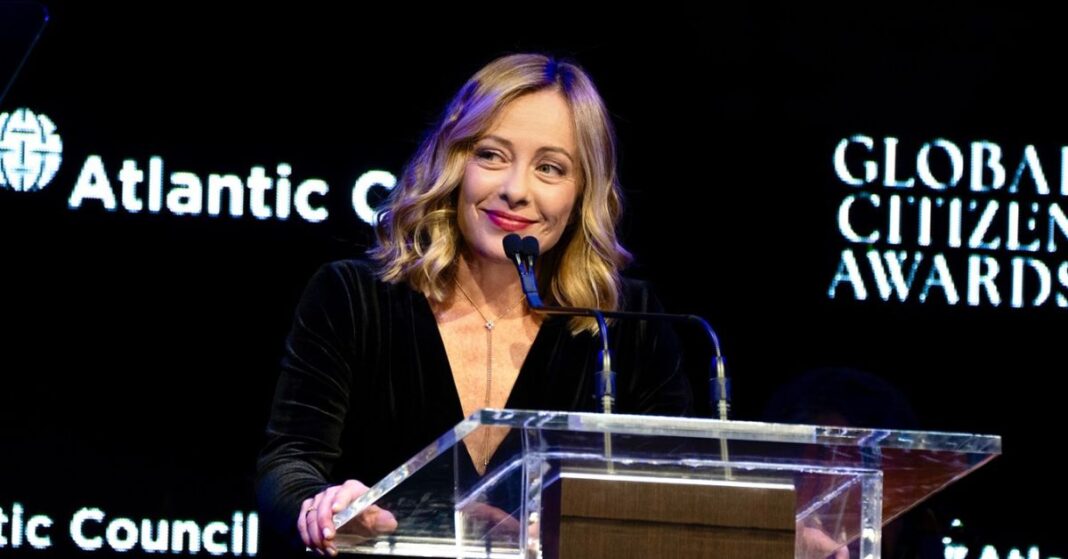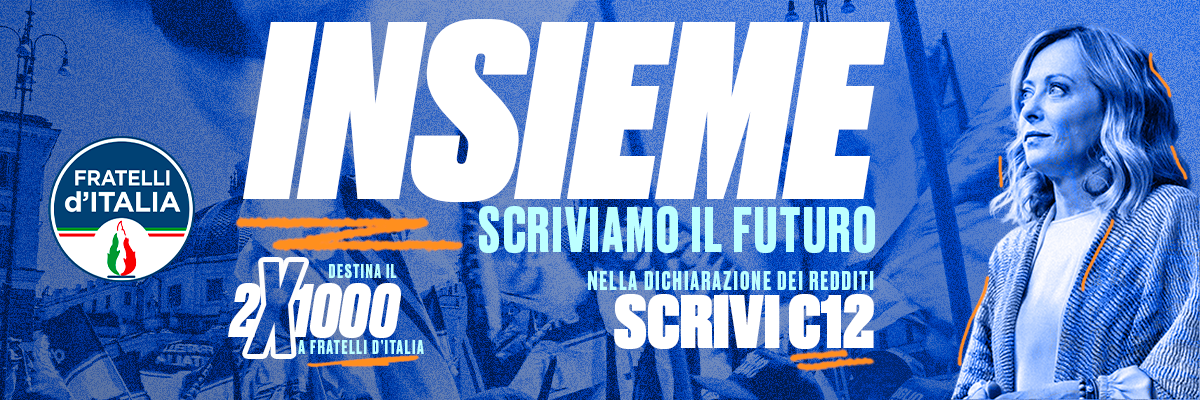The year 2024 marks the turning point of the Meloni government, handing it the plaque of seventh-longest government in Republican history. A year studded with undoubted successes for the prime minister, who brings home the post of executive vice-president of the European Commission for Raffaele Fitto, the endorsement of Donald Trump – “he is a leader and a fantastic person”- and the ‘coronation’ of ‘Politico’ as the “most powerful person in Europe”, the “strongest character” in relations between Brussels and the States.
But let us go step by step. The year we are about to leave behind is also marked by the Italian presidency of the G7, with the summit of the Greats in Borgo Egnazia, the last for Joe Biden as President of the States. It is the year of the premier’s friendship with Elon Musk, the domino man of ‘The Donald’s’ election campaign.
If the year 2024 at Palazzo Chigi were to be recounted in a collection of photos, they would include the photo of Biden’s paternal kiss on Meloni’s head in the setting of the White House, the shot of the prime minister with her head in her jacket to mock the opposition which ended up in the Wall Street Journal, the photo opportunity with Chico Forti who had returned to Italy after 24 years in prison in America, and the handshake with a swipe at Vincenzo De Luca: ”I am that bitch Meloni,” the premier self-apostrophised, causing the frost to fall on the fuming Dem governor.
But let us proceed step by step again, recounting the Italian premier’s 2024. A year that opened in January with the green light for the much-discussed reform of differentiated autonomy, in the crosshairs of the opposition as ‘splitting Italy’, and with the ‘Italy-Africa international summit’ that saw all the nations of the continent come to Rome, on the initiative of the prime minister, to give life to the Mattei Plan. In February, following legal proceedings, the undersecretary at the Ministry of Culture Vittorio Sgarbi resigned after a meeting with the Prime Minister at Palazzo Chigi.
On 24 February, on the occasion of the second anniversary of the start of the Russian invasion of Ukraine, Meloni flew to Kiev with European Commission President Ursula von der Leyen, Belgian Prime Minister Alexander De Croo and Canadian Justin Trudeau, where she chaired a G7 meeting together with President Volodymyr Zelensky.
This is the umpteenth confirmation of Italian support for the Ukrainian cause, with respect to which, even in this 2024, the Prime Minister has never taken any steps back or shown any hesitation.
In March, the Prime Minister travelled to Washington D.C. for a new meeting with President Joe Biden. From the USA, he announces the return home of Chico Forti, at the centre of a controversial court case in which he has been detained in America for 24 years.
March is also the month of a heated back-and-forth with the judiciary, neither the first nor the last, this time triggered by the go-ahead given by the CoM to the introduction of psycho-aptitude tests for magistrates.
April opened with two motions of no-confidence, both rejected: one touched Matteo Salvini and concerned the League’s relations with Vladimir Putin’s United Russia party, the other the Minister of Tourism Daniela Santanché in relation to the investigations into the companies Visibilia, Bioera and Ki Group.
At the end of the month, from the Fdi convention in Pescara, Meloni announces her descent into the field for the European elections, inviting voters to write on the ballot paper even only her first name, ‘Giorgia’. The premier plays the empathy card and bets on her leadership.
The results seem to prove her right: at the polls in June, Fdi was confirmed as Italy’s leading party (28.8%), improving by almost three points the result of the general election that handed her the keys to Palazzo Chigi. After approving the abrogation of the crime of abuse of office, the government at the end of May returned to the field of justice and approved a constitutional revision bill aimed at reforming the system of the judiciary, specifically providing for a mandatory separation of the judiciary and the judiciary and the related introduction of two new self-governing bodies intended to retire the Superior Council of the Magistracy.
In June, the Council of Ministers approved two measures to ‘chop down’ the waiting lists of an ailing healthcare system. Oppositions rumbled, pointing the finger at measures they considered hollow and lacking in resources. Also in June, before flying to Puglia for the G7 summit, Meloni travelled to Albania with Interior Minister Matteo Piantedosi to check the state of the art of the work on the two Italian-flagged hotspots.
From 13 to 15 June, the world spotlight will turn on Puglia, in Borgo Egnazia, for the summit of the world’s seven greats. The summit hits the target of a 50 billion loan to Ukraine on frozen Russian assets, but is also marked by tensions between Meloni and French President Emmanuel Macron. Triggering the duel is the issue of abortion in the summit’s final declarations, but also playing out under the surface is the game of new EU governance. On Brussels in July the prime minister makes an unexpected choice and, to the general astonishment, votes against the reconfirmation of Ursula von der Leyen, destined for an encore at the helm of the European Commission.
M, at the head of the Conservative group, despite his excellent relations with the German leader is calling it quits, along with the Patriots of Matteo Salvini, Viktor Orban and Marine Le Pen. A move that, in the international arena, many read as a potential and dangerous isolation of Italy. At the end of the month, the Prime Minister flies to China and tries to mend the rift that was consumed at the end of 2023 with the farewell to the Silk Road.
On 30 August, the Council of Ministers officially approved Raffaele Fitto’s candidature for European Commissioner. A handful of days later, a new landmine exploded that could shake the entire government with the case of Culture Minister Gennaro Sangiuliano. The Prime Minister, after initially rejecting the Culture Minister’s resignation, is forced to accept it in order to curb the shock wave that has swept through the government and ‘calls’ Alessandro Giuli to replace Sangiuliano.
In September, Meloni flies to New York for the 79th United Nations General Assembly and, before the start of the proceedings, meets the CEOs of Google, Motorola and Open Ai to discuss investments by the big i-tech companies in Italy. In New York, it is above all the Prime Minister’s decision to receive the Atlantic Council award from the hands of Elon Musk that is causing discussion, all the more so since it is accompanied by the decision to ‘desert’ the traditional dinner offered by the Biden family to the heads of state and government present in the ‘Big Apple’, a choice that many read as a ‘disengagement’ by Meloni towards the Dem administration in light of the possible rise of Donald Trump.
In October surrogacy, already banned in Italy, became a universal crime, punishable even abroad if carried out by Italian citizens. In the same days, the government was faced with a new problem: the first 12 migrants disembarked in the Albanian port of Shengjin were sent back to Italy because the court in Rome did not validate their detention in the Italian detention centre for repatriation in Gjader, the result of the Rome-Tirana agreement.
The Rome judges’ decision risks calling into question the entire framework of the Memorandum signed by Giorgia Meloni and Edi Rama. A handful of days later, the Cdm adopted an ad hoc decree-law to define and update the list of ‘safe countries of origin’, previously regulated by a simple inter-ministerial decree, thus ‘elevating’ it to a primary level source.
The aim is to jump the hurdle that undermines the start-up of the two hotspots in Albania, which, however, still remain empty pending the European Court of Justice’s ruling. Meloni continues to vigorously defend the project on Albanian soil, saying she is convinced that it is a strategy that is not only valid but exportable and expendable in Europe to curb the ‘mafia of human traffickers’ and stop deaths at sea.
On 21 November, after the G20 in Rio de Janeiro, Meloni reached Buenos Aires for her first mission to Argentina. With ‘friend’ Javier Milei, the premier looks out from the balcony of the Casa Rosada, made famous for the speeches with which Evita Peron inflamed the ‘descamisados’.
Milei the ‘loco’, as he is called in Argentina and as he likes to be called outside the country, a friend of Trump’s to the extent that he flew to Mar-a-Lago to celebrate his victory, the Argentine president relaunches the idea of a ‘sovereignist international’ that unites “countries of the free world that share common values and objectives”, freeing the “West from the darkness that envelops it”. In Milei’s sky, the dots connect Trump’s States to the ‘old Europe’ personified by Meloni.
On 27 November, the new European Commission was born, once again headed by von der Leyen. Fdi votes in favour, after the positive signal received from the German leader on the appointment of Fitto, who was elected European Commissioner and Executive Vice-President of the Commission.
After Fitto’s farewell, in his place Meloni called Tommaso Foti to the team, keeping however for himself the delegation for the South. On seven December, almost as a surprise, Meloni flew with President of the Republic Sergio Mattarella to Paris to attend the reopening to the public of the Notre-Dame Cathedral, destroyed by fire in April 2019.
During the dinner organised by Macron, with the help of his friend Musk, she had her first fruitful face-to-face meeting with Donald Trump, an ‘appetiser’ for an alliance that promises to be very solid. And that could lead Meloni to play a leading role on the Washington-Brussels route: she could be the right person to oil a mechanism that at the moment seems to be squeaking, between the bogeyman of duties and the unknown future of Ukraine. It is with this conviction that ‘Politico’ honours her with the title of ‘the most powerful person in Europe’. ”Who do you call if you want to talk to Europe?”, reads the motivation for the award: ”If you are Elon Musk, the richest man in the world and key advisor to US President-elect Donald Trump, the number you dial is that of Giorgia Meloni”.



